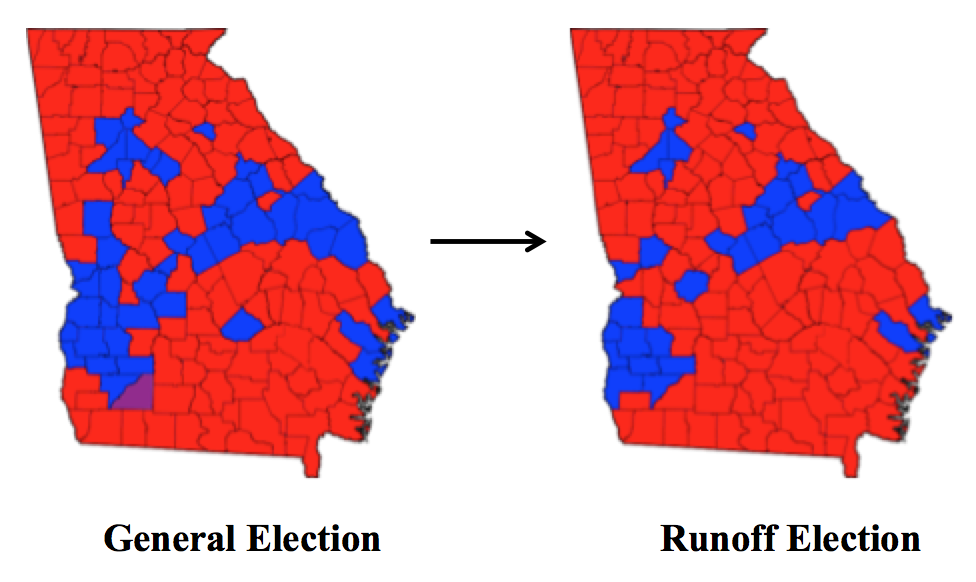In the most populous state in the Deep South, two Democratic candidates have put together strong campaigns for governor and Senate. Will it be enough to notch the first victories for Georgia Democrats seeking these offices this century?
Senator Saxby Chambliss’s open seat has become a battleground in the fight for control of the Senate between Republican David Perdue and Democrat Michelle Nunn. Incumbent Governor Nathan Deal’s reelection bid could be upset by his Democratic challenger, Jason Carter. Polls of likely voters show an incredibly close race in both elections, and none of the four candidates have enjoyed over 50 percent support. This is significant because Georgia requires a runoff election if no one gets a majority of the votes, and both races have Libertarian candidates who could potentially play spoiler and force a runoff, as was the case in 2008.
How did Georgia – a solid red state – get to this point? Georgia’s conversion to the Republican Party is a relatively recent phenomenon: the state elected its first Republican governor since Reconstruction only in 2002, and Bill Clinton carried the state in his first election campaign in 1992. In 2008, the Obama campaign ambitiously targeted Georgia as a swing state for some time, and in fact, the margin of Republican victory in the two most recent presidential elections was markedly smaller than in 2004 and 2000. Saxby Chambliss, the retiring GOP senator, was unable to carry a majority in his last election, resulting in a runoff.
Could Republican dominance in Georgia be threatened, at least for statewide elections? Demographics are certainly on Democrats’ side here. White evangelicals are declining as a percentage of the population across the South, the Peach State being no exception. Since 2007, their share of the state population declined from 32 percent to 24 percent, while the religiously unaffiliated grew from 13 to 16 percent in the same time period. The state is also urbanizing at an increasing rate, especially in the capital of Atlanta. And like the country as a whole, the share of whites is declining while minority (African-American, Asian, and Hispanic) populations recorded significant demographic growth in the past decade.
That being said, a Democrat has not won a Senate race in Georgia since 1996 and the governor’s mansion since 1998. And while Senator Chambliss needed a runoff to secure reelection over Democrat Jim Martin in 2008, he cruised to victory with a much lower turnout, picking up over 57 percent of the vote with barely half the turnout of the general election.

The results of the election by county show the high hurdle for Democrats to win in a runoff: Martin won several counties in metro Atlanta as well as a wide swath of middle Georgia, but failed to repeat the same performance in the runoff a month later.
For Nunn and Carter to capitalize on Georgia’s changing demographics and increasing electoral competitiveness, they will need to motivate minority and urban voters on Tuesday. The odds of success in a runoff election are slim given the past performance of Democrats but they are both stronger candidates than the hapless ones the state party has fielded in past elections. No matter what happens at the voting booths this time around, Georgia’s deep red has started to lighten considerably.
Andrew Shell is Managing Editor at the Georgetown Public Policy Review and studying public policy at Georgetown University’s McCourt School. A Georgia native and 2010 graduate of the University of Georgia, he served in the Peace Corps in Ukraine for two years before moving to Washington, DC in 2013 where he currently resides.

Wrong!